Quality engineers, also called health and safety engineers, quality control, or quality assurance engineers, are some of the most in-demand occupations these days. This line of work is growing steadily, with plenty of opportunities for young professionals looking for a job. However, high demand makes it challenging to get an actual position in a reputable quality assurance or quality control company. New applicants need an enthralling quality engineer resume to stand out.
Let’s discuss what a quality engineer does, their expertise, and the positions they can apply for using a quality engineer resume. We will also provide tips for creating a compelling resume as a quality engineer.
What Is a Quality Engineer Resume?
Quality engineers can find jobs in various industries. Their job is to ensure that work equipment and environment are safe for employers and employees. Whether working in a software company or a factory, a quality engineer takes care of the people, the equipment, and the property.
A quality control professional monitors the work environment and assesses the condition of the workspace and the tools employees regularly use, including the quality of items they produce. They create reports and recommend solutions for complying with quality and safety regulations.
As a quality assurance engineer, your job is to ascertain whether a particular product meets quality requirements and is free of any problems or defects. You do that by conducting a series of tests and gathering information from staff, suppliers, developers, etc.
Quality engineers typically work in practical industries, such as production or manufacturing. However, QA engineers test technology and software products and services, such as mobile applications, software tools, and websites. Regardless of the industry, quality engineering is an overwhelmingly competitive marketplace. The only way to get ahead of the competition is to create an engaging and attention-grabbing resume that will compel employers to choose you over other candidates.
How to Format a Quality Engineer Resume
You have three options for formatting your quality engineering resume – chronological, functional, and hybrid (a combination of both). A hybrid resume format or a combination resume is a comprehensive resume format that brings together the functional and chronological format. It is the best option for highlighting an applicant’s achievements and skills before work experience.
The functional resume format focuses on your training, education, and skills. That is why it’s an appropriate option for creating a captivating entry-level resume that will resonate with the employer and convince them you’re the right choice for the company. Your objective here is to make a memorable first impression and impress your potential employer by showcasing your skills, knowledge, and expertise. It is essential to provide a resume that matches the specific requirements and displays your willingness to contribute to the institution. Create a comprehensive list of your strengths and add details on your educational background to support your claims.
A reverse chronological resume format is an appropriate option for providing employers with a clear timeline view of your past accomplishments, highlights, achievements, and work history.
It should include the following details:
- Personal and contact information
- Objective statement
- Education
- Skills
- Work experience
- Certification
The objective is to inform hiring managers of your retrospective growth as a quality engineer and how you’ve developed yourself as a professional in the industry. Start with your current job and go backward. Include bullet lists to make your resume more readable and easier to scan.
5 Simple Steps to Create an Effective Quality Engineer Resume
Here are five steps to creating an engaging quality engineer resume:
Step 1: Write a resume objective or summary
A resume objective or summary could elevate your chances of getting hired. You need a well-written and intriguing objective statement to captivate your future employer’s attention. Study the resume requirements to ascertain the employer’s expectations and follow their instructions for conforming to their expectations.
Your resume objective should inform the reader of what makes you an ideal candidate. State your qualifications, such as years of experience, training, and certifications, to set yourself apart from other applicants. Remember to keep your resume objective on-point since your resume is part of your formal introduction to the company.
Here is an objective sample:
“Quality engineer with more than six years experience working in the quality assurance company. Dedicated to gathering and analyzing data to provide developers with actionable insights.”
Aside from your qualifications, add a few short sentences regarding your most impressive accomplishments in the summary section. That should help you catch the hiring manager’s attention from the beginning.
A resume summary elevates your chances of getting a job. Include your most relevant achievements at the start of your resume and focus on job-specific skills to secure your position with the employer.
Here’s an example of a captivating quality engineer resume summary:
“Skillful and resourceful quality engineer with a keen eye for detail and eight years of experience in quality control, quality auditing, and quality assurance for software-developing environments.
Proven track record of providing solutions and effective QA procedures for developing integration tests for complex business use cases. My area of expertise includes achieving productivity and quality goals, developing daily status reports, building quality assurance tests, and conducting ISO audits.”
Step 2: Add skills to your quality engineer resume
Since quality engineers hold a lot of responsibility regarding safety and quality standards, your resume should express your dedication to coping with the latest standards and industry trends. The best way to highlight your readiness and awareness is to showcase QE-specific hard and soft skills. These skills are paramount for someone responsible for maintaining efficient operations and ensuring internal and external quality compliance. Start by creating a list of your hard skills so hiring managers can quickly evaluate your technical qualifications.
Required hard or technical quality engineer skills include:
- Auditing
- Documentation
- Quality control analysis
- Resource allocation
- Legal regulations
- Safety standards
- Microsoft Office
- Microsoft Access
- Atlassian JIRA
- Minitab
- Microsoft SQL Server
- Linux
- SAP
- Six Sigma
- Introduction to manufacturing and engineering processes and workflows
- Familiarity and compliance with industry quality standards
Aside from technical skills, a quality engineer should also possess valuable soft skills. The combination of hard and soft skills makes you stand out as an applicant.
Here are the top soft skills:
- Project management skills
- Collaboration
- Multitasking
- Prioritization
- Leadership skills
- Decision-making
- Time management skills
- Critical thinking
- Interpersonal skills
- Communication skills
- Accuracy
- Attention to detail
- Analytical skills
- Organizational skills
Out of all these soft and hard skills, attention to detail, communication, technical skills, and teamwork are crucial for representing yourself as a professional, reliable, and knowledgeable quality engineer. You must be able to act swiftly to mitigate critical situations, collaborate with your coworkers, master specific software tools, and take the lead if need be.
Here’s an example of an engaging skills section:
“Developed more than 90 test suits for software programs and actively participated in developing and implementing HAZMAT emergency response team programs, certifications, and training procedures.”
Step 3: Include valid work experience
Recruiters who find your resume acceptable will want to check your work experience. At this point, this section is what will help you get an interview. Your work experience will help you reach an agreement with the recruiter.
However, you should add your previous and current experiences carefully, starting with your most recent work and moving on to the other areas of expertise, such as reliability engineering, quality assurance, Six Sigma, and quality control.
Recruiters rely on your work experience to understand what qualifies you for the quality engineer position, including your qualifications. If you have a rich work history, emphasize it by including examples of training staff members, advancing, and leading roles. Add some statistics, facts, and figures as social proof of your efficiency.
Here’s a good example:
“Contributed to developing and implementing continuous integration processes and workflows, resulting in improved shipping efficiencies and a 300% decrease in production incidents.”
The work experience section should demonstrate your dedication to problem-solving and taking the initiative in critical situations. Keep your previous employment experiences short and to the point, and be honest about your achievements. Remember that your resume shouldn’t exceed two pages. These guidelines help both professional quality engineers and recent graduates craft engaging and attention-grabbing resumes. Modern-day employers require concise, easily readable documents that they can scan in a few seconds and find the information they need.
Pro tip: Inadequately structured resumes force hiring managers to invest time and effort to read between the lines to check the candidate’s skills and experience. Instead, make your skills, experience, and accomplishments easily accessible by listing them to inform the employer of your competencies. Identify the problems you helped solve and explain how you solved them, as it’s critical to getting an interview.
Step 4: Highlight your relevant and advanced education
Bachelor’s degree is the lowest education requirement for quality engineers. In addition, applicants should state their professional training and certifications.
However, hiring managers and recruiters prefer a master’s degree when selecting top-grade candidates. If you have advanced certification, many years of experience, and a master’s degree, your chances of getting the job look much better.
Here’s an example:
Bowling Green State University
Bachelor of Science in Technology, Quality Systems, 2013 – 2016
The best candidates will have a competitive mix of experience, training, and education. You must have a bachelor’s degree for entry-level quality engineer positions in quality-specific, mechanical, and industrial engineering.
If you’re aiming for senior and management roles, a master’s degree is the main requirement for hiring. Such positions also require critical databases and software tools, such as MiniTab, CaWeb, MPact, Microsoft Office, Excel, etc.
As usual, keep this section as short as possible. Avoid writing too many details and mentioning every conference you may have visited. It’s vital to emphasize advanced quality assurance education and certifications that complement your quality engineer work experience.
Step 5: Add additional sections
Aside from your education, skills, work experience, objective, and summary, you may also include additional sections in your quality engineer resume.
Courses
Taking one or several courses can significantly improve your chances of getting a job. Courses are the best proof of your dedication to continuous education. This also showcases your willingness to give your 100% and aspiration toward specialization.
While there are many specialized engineering courses, the most common training courses include those for passing the ASQ’s quality engineer certification exams. Since things constantly change in the quality engineering industry, professionals must work on their skills to upgrade their knowledge and compete for higher positions and salaries.
We recommend looking into the Institute of Electrical and Electronics Engineers (IEEE), the American Society of Mechanical Engineers (ASME), and the American Society of Civil Engineers (ASCE) if you’re looking for the best online courses for quality engineers. These professional societies offer the best technical and professional training programs for quality engineers.
Here’s how to include your courses in a quality engineer resume:
“CaWeb and MiniTab Made Easy
Total Quality Management (ASME)
Certified Quality Engineer Certification Preparation”
Certifications
If you’re aiming at higher-paying positions as a quality engineer, you’ll need a Professional Engineering (PE) license. There are several professional certification options to consider.
Health and safety and quality engineers should consider certifications by:
- The Associate Safety Professional (ASP);
- Occupational Health and Safety Technologist (OHST);
- The Certified Safety Professional (CSP);
- The Certified Industrial Hygienist (CIH);
- The American Society of Professionals’ Certificate in Safety Management (CSM);
- The International Council on Systems Engineering’s Certified Systems Engineering Professional (CSEP);
- The American Society for Quality’s Certified Quality Engineer.
Here’s a sample of the Certifications section in a quality engineer resume:
“CSEP
ASP
Certified Quality Engineer (ASQ)”
In addition to OTJ, engineers with degrees must achieve a passing score on the Fundamental of Engineering (FE) exam to qualify for the PE exam.
Free Templates
Since writing a quality engineer resume from scratch takes a tremendous amount of time, patience, and effort and is prone to making mistakes, we recommend looking into pre-made resume templates for quality engineers. Aside from helping you save time and effort, pre-made templates provide all the necessary sections that give proven results. So, download our free, customizable templates, fill out the required details, and wait for an interview invitation.
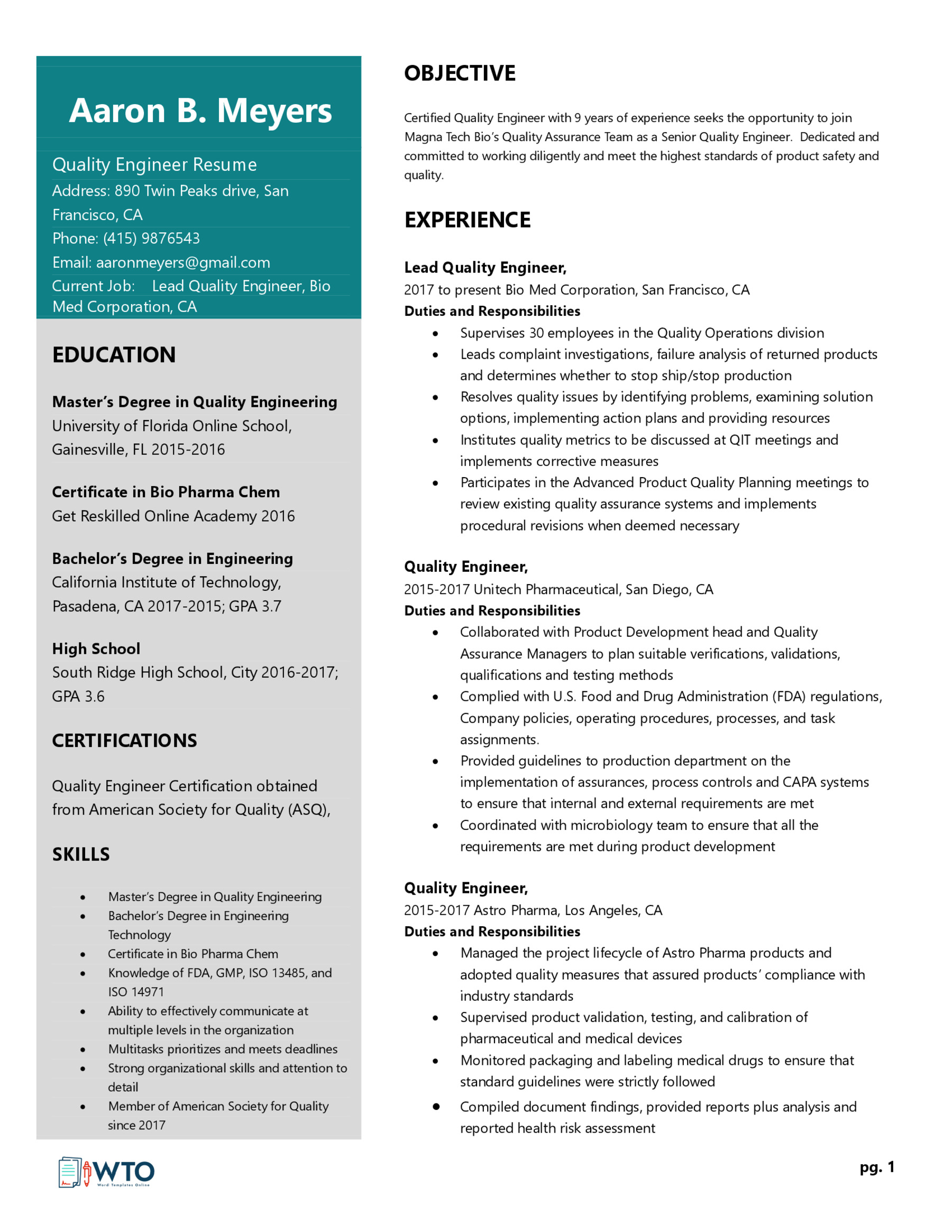
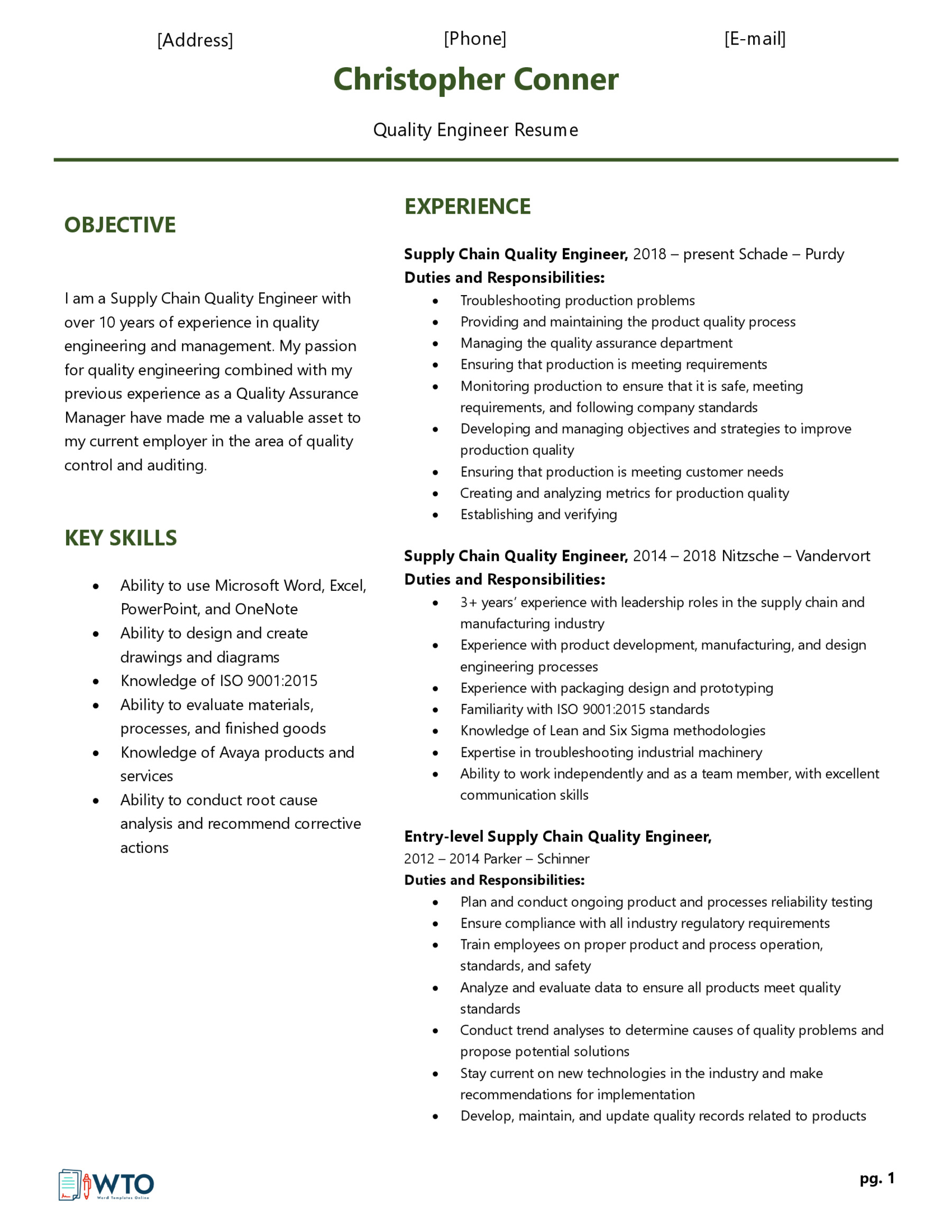
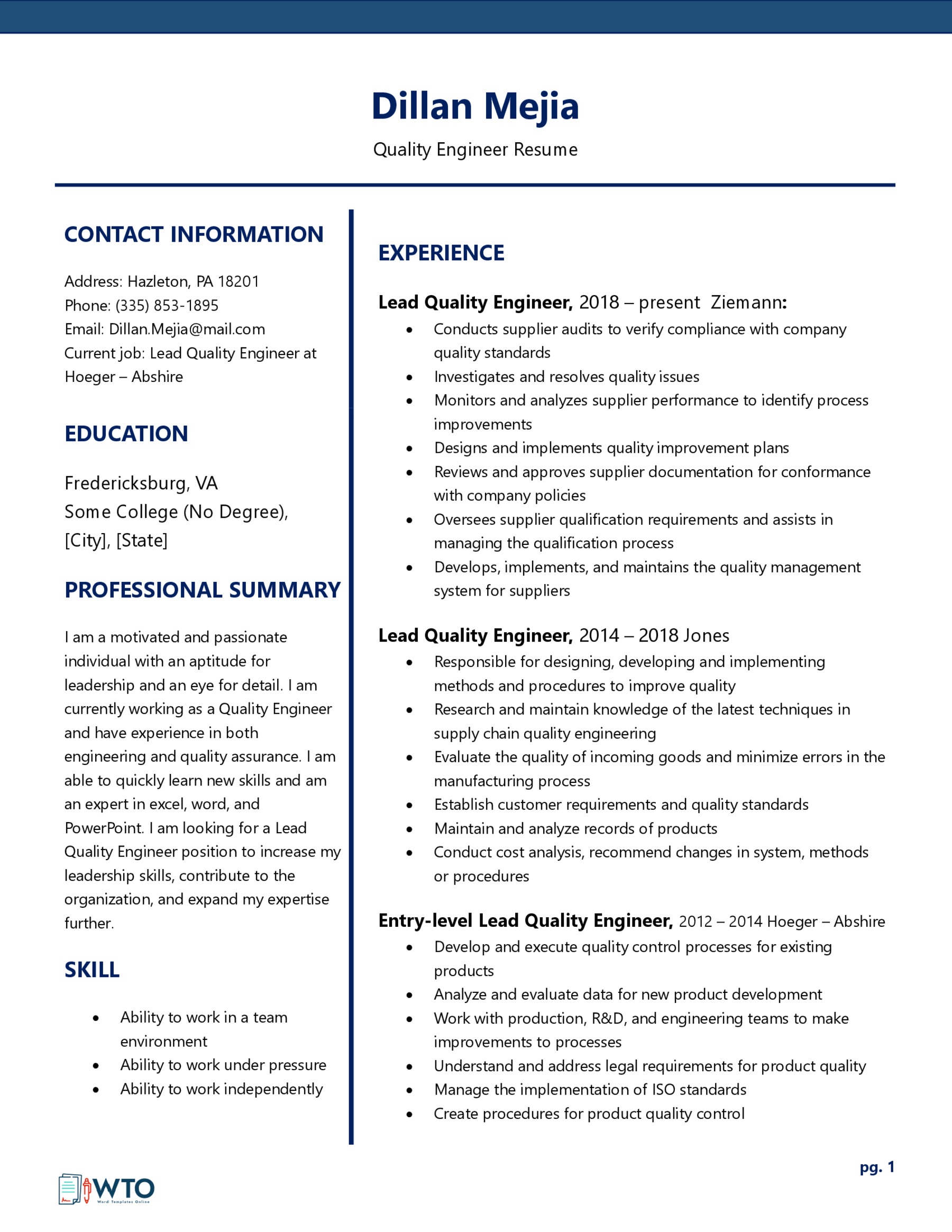
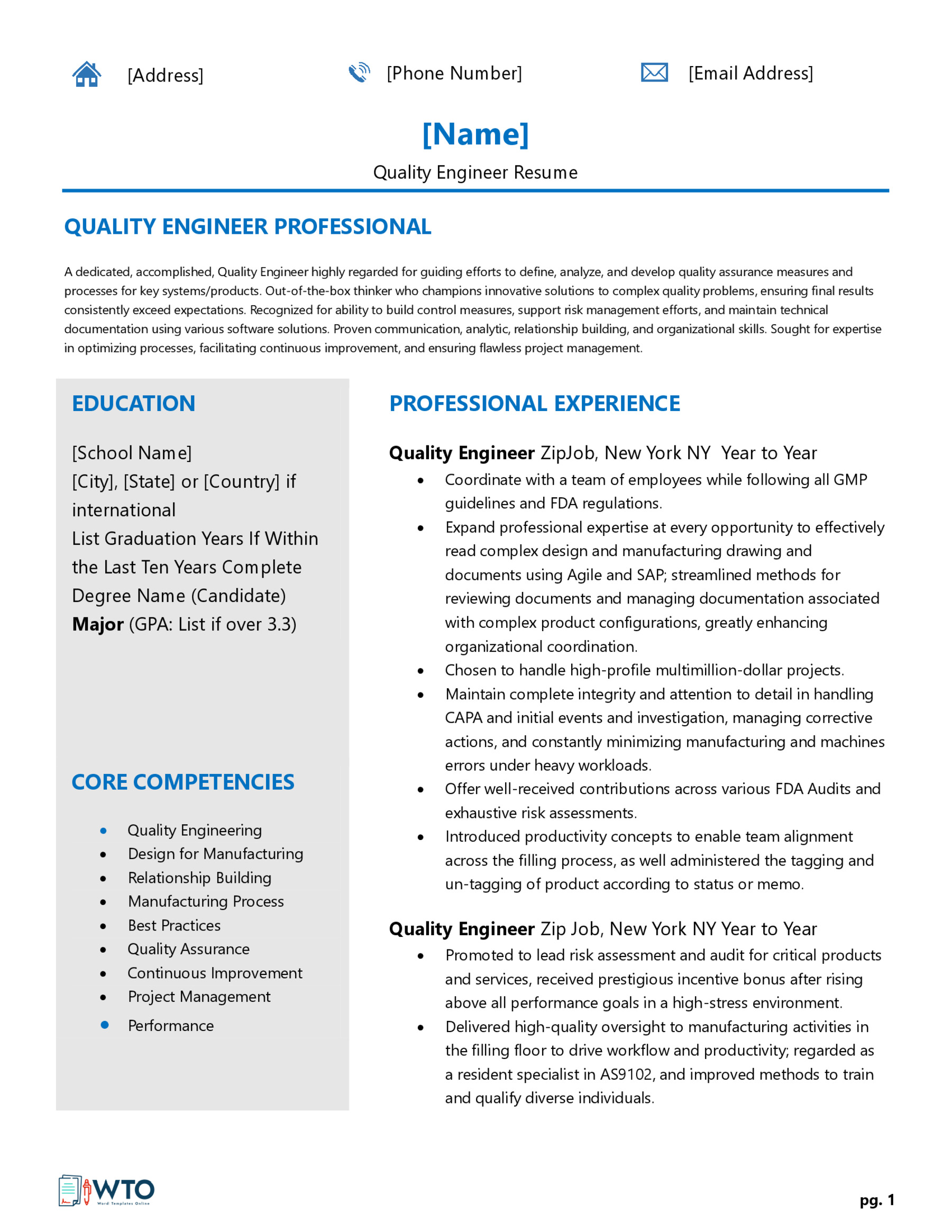
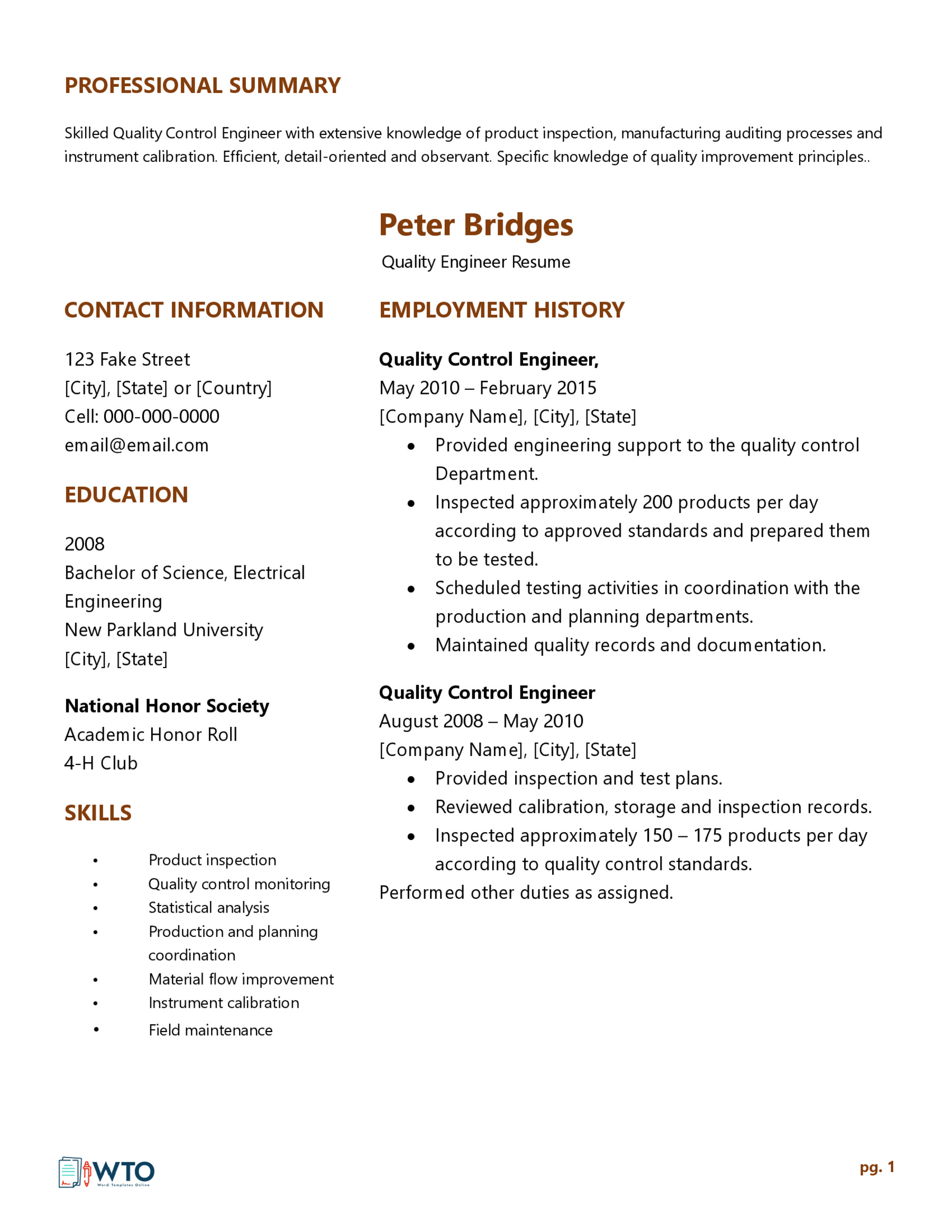
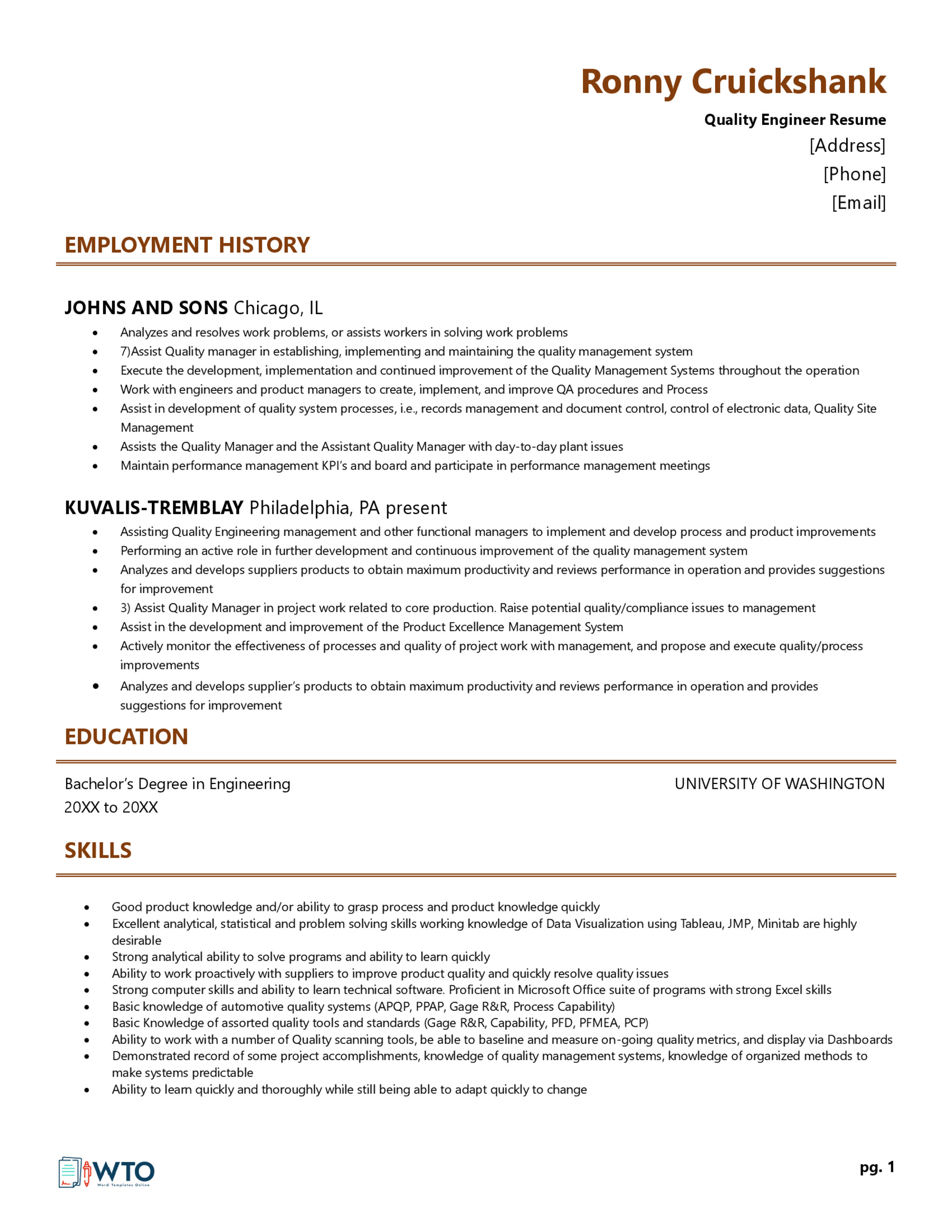
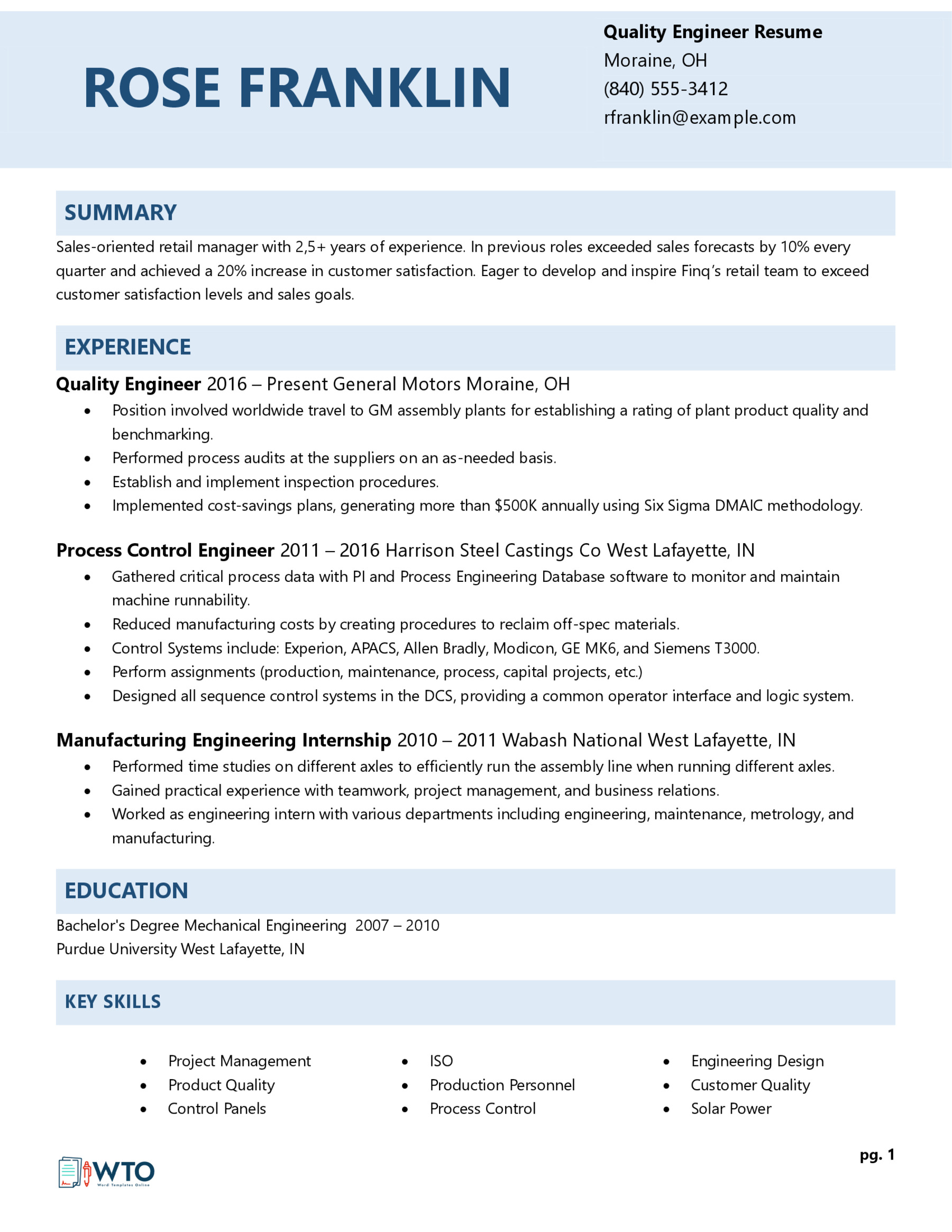
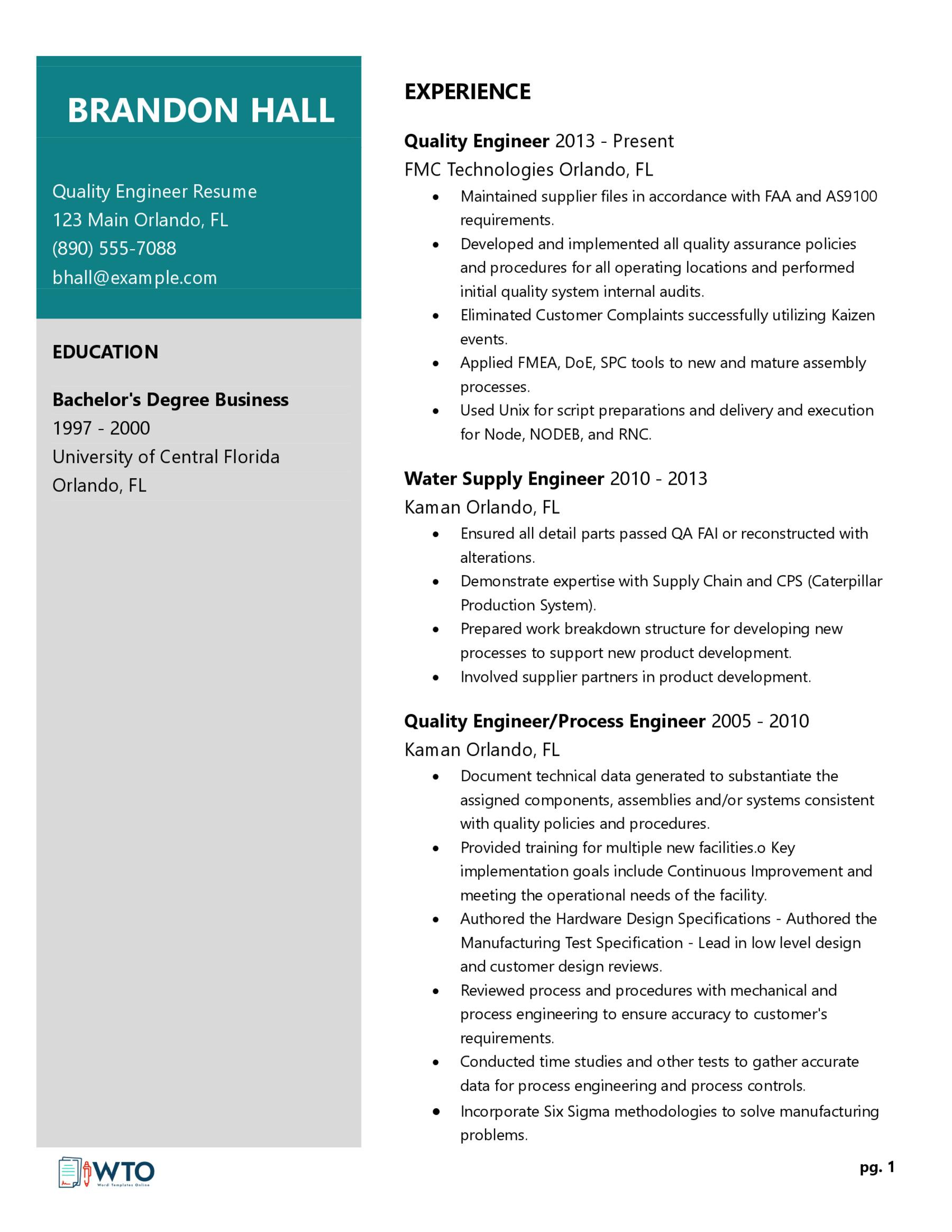
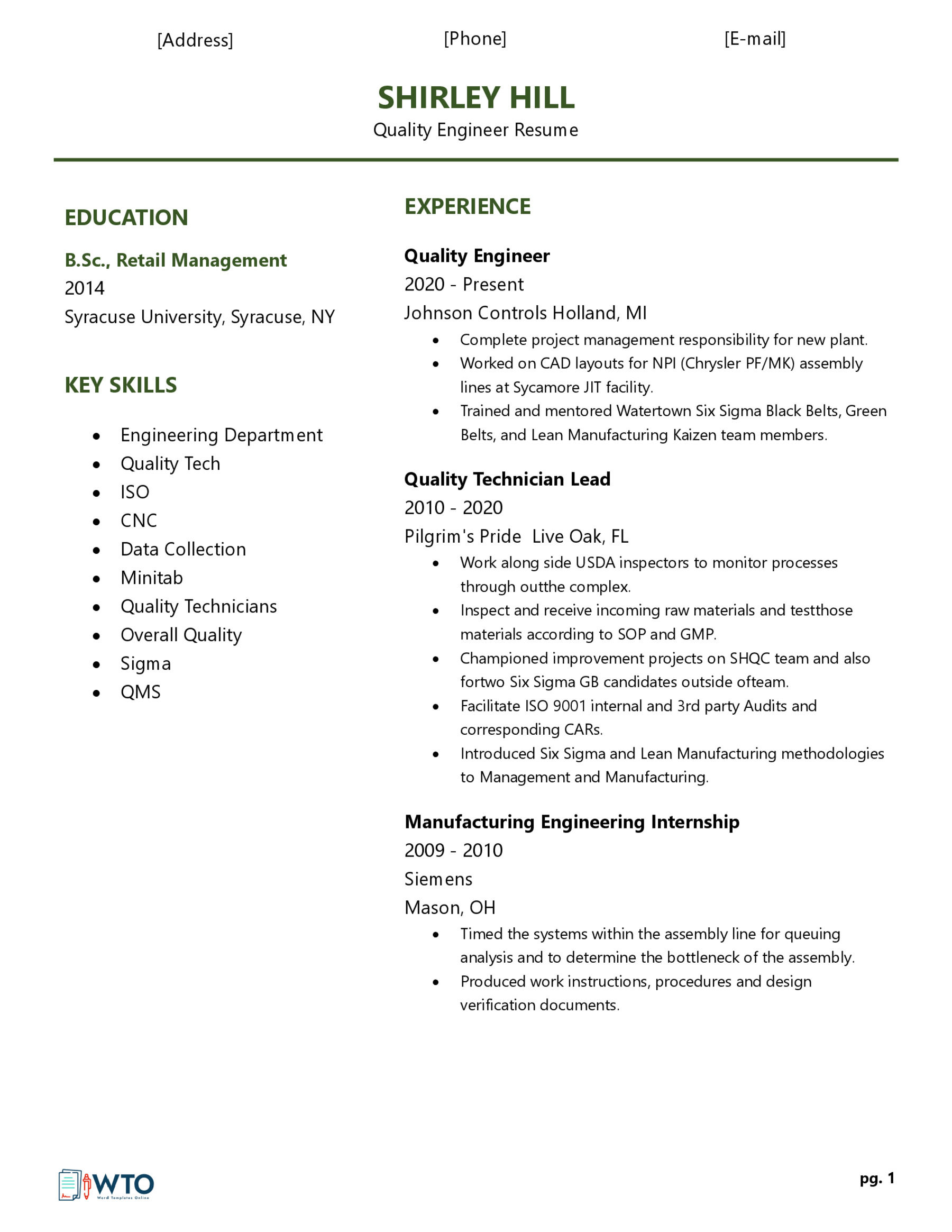
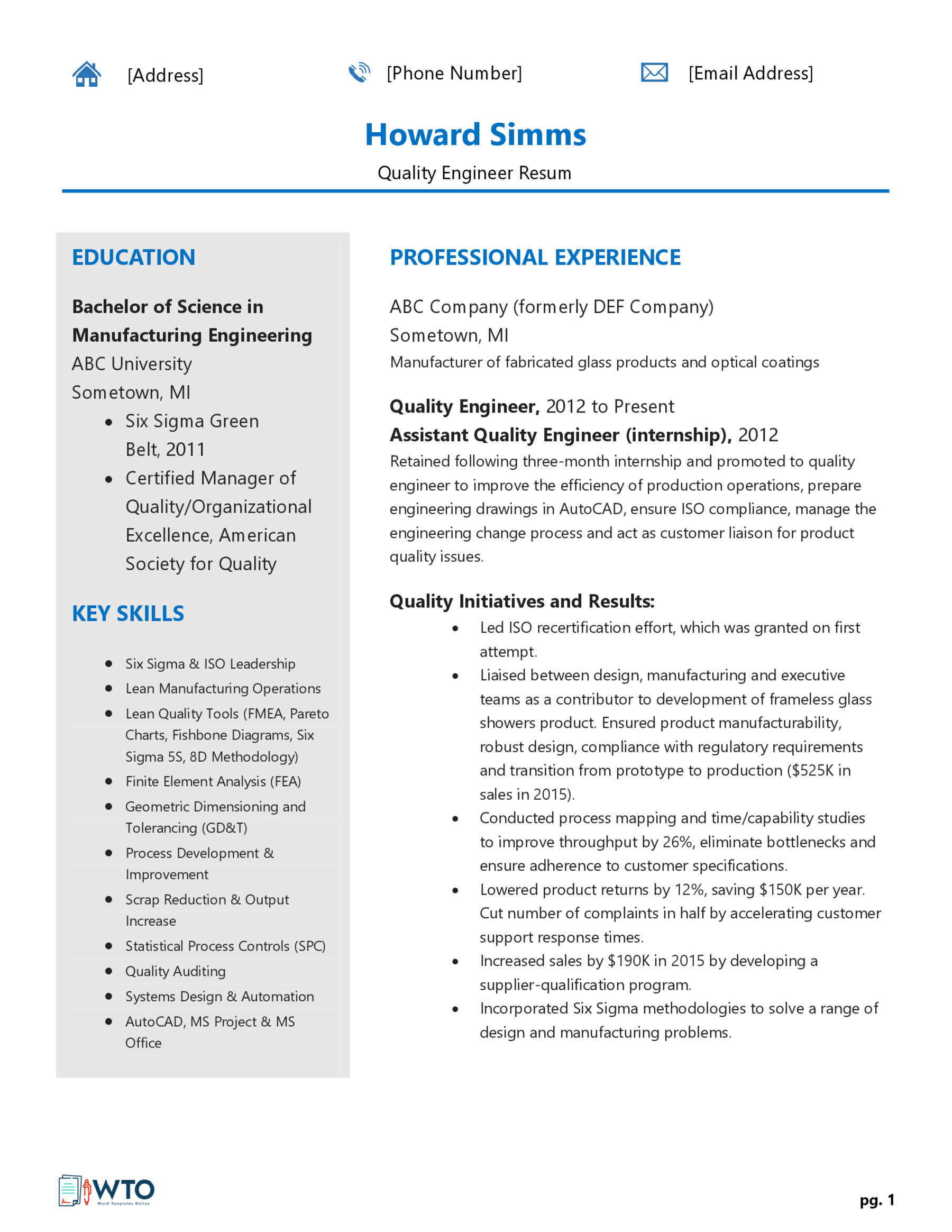
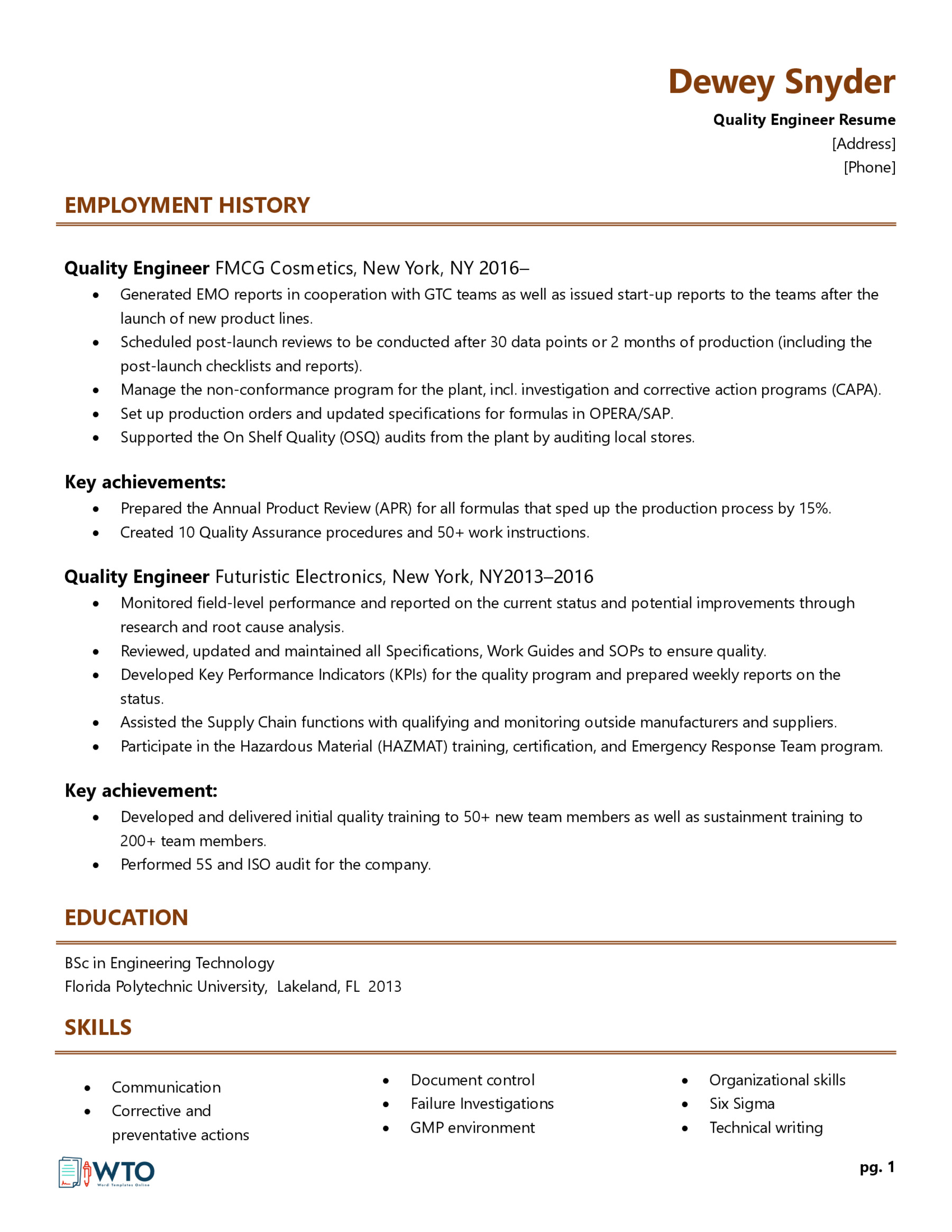
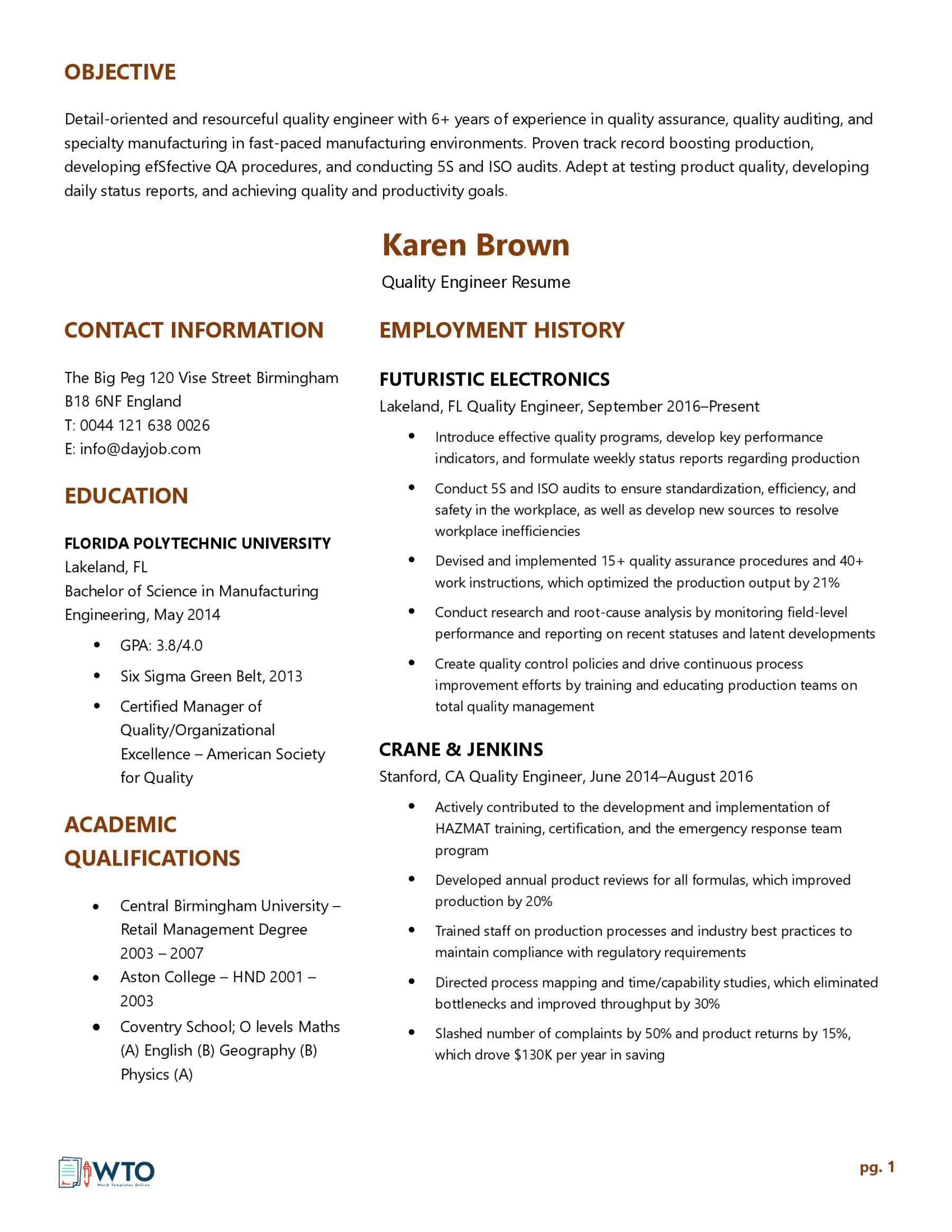
Do’s and Don’ts
Since we want to ensure you understand all the requirements for creating an engaging and effective quality engineer resume that will win you the job of your dreams, here’s our brief review of do’s and don’ts you should keep in mind:
Do’s
The goal of hiring quality engineers is to acquire efficient and reliable professionals who can maximize production by maintaining high levels of product quality. Therefore, you need a captivating resume to highlight your qualifications as a top candidate. Action verbs in bullet points can help you captivate recruiters by highlighting your most relevant accomplishments.
Here are some action verbs to consider:
- Allocated
- Coordinated
- Directed
- Developed
- Devised
- Directed
- Enhanced
- Established
- Exceeded
- Facilitated
- Forecasted
- Improved
- Implemented
- Oversaw
- Maximized
- Motivated
- Reduced
- Spearheaded
- Streamlined
- Supervised
- Trained
- Transformed
Next, you should use metrics to add more merit to your claims. Metrics complement your efforts to score an interview for the quality engineer position. These can be statistics, facts or figures, or a combination of all three.
Use metrics in your resume to demonstrate what you’re capable of accomplishing and showcase your willingness to contribute to the company’s effort to increase productivity and efficiency while saving time, effort, and resources.
Here are some excellent metrics examples:
- Promoted within 12 months;
- Monitored a team of 12 quality technicians;
- Managed 70 vendors;
- Streamlined production processes, resulting in saving over $100,000.
Finally, tailor your resume to match the job requirements. Adapt your information to the specific role to better suit the job specifics.
Don’ts
Proofread your resume before sending it to avoid making grammatical and spelling mistakes. No recruiter will take you seriously if you send them a resume full of such errors.
In addition, keep your resume short and neat by limiting it to not more than 2-3 pages. Hiring managers go over a lot of resumes daily. If yours is too long, they might not even consider reviewing it. In most cases, two pages will suffice.
Final Thoughts
If you’re looking for a job as a quality engineer, a short, compelling, and effective resume can make all the difference between you and the other applicants. It can highlight your past work experiences, skills, education, training, and accomplishments and point out how you can contribute to the company regarding productiveness, creativity, innovation, savings, and efficiency.
This comprehensive guide should provide the guidelines for crafting a captivating quality engineer resume to match your experience, abilities, and skills to the specific job requirements. Remember to pay special attention to how you format your resume, as it’s critical to getting an interview.








